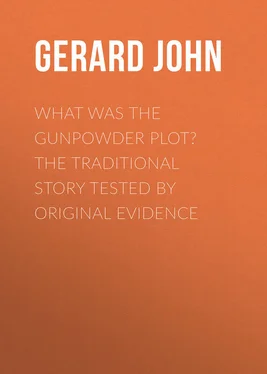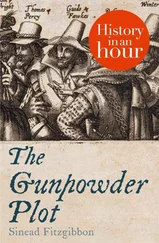John Gerard - What was the Gunpowder Plot? The Traditional Story Tested by Original Evidence
Здесь есть возможность читать онлайн «John Gerard - What was the Gunpowder Plot? The Traditional Story Tested by Original Evidence» — ознакомительный отрывок электронной книги совершенно бесплатно, а после прочтения отрывка купить полную версию. В некоторых случаях можно слушать аудио, скачать через торрент в формате fb2 и присутствует краткое содержание. Жанр: foreign_antique, foreign_prose, на английском языке. Описание произведения, (предисловие) а так же отзывы посетителей доступны на портале библиотеки ЛибКат.
- Название:What was the Gunpowder Plot? The Traditional Story Tested by Original Evidence
- Автор:
- Жанр:
- Год:неизвестен
- ISBN:нет данных
- Рейтинг книги:5 / 5. Голосов: 1
-
Избранное:Добавить в избранное
- Отзывы:
-
Ваша оценка:
- 100
- 1
- 2
- 3
- 4
- 5
What was the Gunpowder Plot? The Traditional Story Tested by Original Evidence: краткое содержание, описание и аннотация
Предлагаем к чтению аннотацию, описание, краткое содержание или предисловие (зависит от того, что написал сам автор книги «What was the Gunpowder Plot? The Traditional Story Tested by Original Evidence»). Если вы не нашли необходимую информацию о книге — напишите в комментариях, мы постараемся отыскать её.
What was the Gunpowder Plot? The Traditional Story Tested by Original Evidence — читать онлайн ознакомительный отрывок
Ниже представлен текст книги, разбитый по страницам. Система сохранения места последней прочитанной страницы, позволяет с удобством читать онлайн бесплатно книгу «What was the Gunpowder Plot? The Traditional Story Tested by Original Evidence», без необходимости каждый раз заново искать на чём Вы остановились. Поставьте закладку, и сможете в любой момент перейти на страницу, на которой закончили чтение.
Интервал:
Закладка:
John Gerard
What was the Gunpowder Plot? The Traditional Story Tested by Original Evidence
PREFACE
The following study of the Gunpowder Plot has grown out of the accidental circumstance that, having undertaken to read a paper before the Historical Research Society, at Archbishop's House, Westminster, as the day on which it was to be read chanced to be the 5th of November, 1 1 1894.
I was asked to take the famous conspiracy for my subject. It was with much reluctance that I agreed to do so, believing, as I then did, that there was absolutely nothing fresh to say upon this topic, that no incident in our annals had been more thoroughly threshed out, and that in regard of none, so far, at least, as its broader outlines are concerned, was the truth more clearly established.
When, however, I turned to the sources whence our knowledge of the transaction is derived, and in particular to the original documents upon which it is ultimately based, I was startled to find how grave were the doubts and difficulties which suggested themselves at every turn, while, though slowly and gradually, yet with ever gathering force, the conviction forced itself upon me, that, not merely in its details is the traditional story unworthy of credit, but that all the evidence points to a conclusion fundamentally at variance with it. Nothing contributed so powerfully to this conviction as to find that every fresh line of reasoning or channel of information which could be discovered inevitably tended, in one way or another, towards the same result. In the following pages are presented to the reader the principal arguments which have wrought this change of view in my own mind. 2 2 Some of these have been partially set forth in a series of six articles appearing in The Month , December 1894 – May, 1895.
I cannot pretend to furnish any full or wholly satisfactory answer to the question which stands upon the title-page. The real history of the Plot in all its stages we shall, in all probability, never know. If, however, we cannot satisfy ourselves of the truth, it will be much to ascertain what is false; to convince ourselves that the account of the matter officially supplied, and almost universally accepted, is obviously untrue, and that the balance of probability lies heavily against those who invented it, as having been the real plotters, devising and working the scheme for their own ends.
Neither have I any wish to ignore, or to extenuate, the objections which militate against such a conclusion, objections arising from considerations of a general character, rather than from any positive evidence. Why, it may reasonably be asked, if the government of the day were ready to go so far as is alleged, did they not go further? Why, being supremely anxious to incriminate the priests, did they not fabricate unequivocal evidence against them, instead of satisfying themselves with what appears to us far from conclusive? Why did they encumber their tale with incidents, which, if they did not really occur, could serve only to damage it, inasmuch as we, at this distance of time, can argue that they are impossible and absurd? How is it, moreover, that the absurdity was not patent to contemporaries, and was not urged by those who had every reason to mislike and mistrust the party in power?
Considerations such as these undoubtedly deserve all attention, and must be fully weighed, but while they avail to establish a certain presumption in favour of the official story, I cannot but think that the sum of probabilities tells strongly the other way. It must be remembered that three centuries ago the intrinsic likelihood or unlikelihood of a tale did not go for much, and the accounts of plots in particular appear to have obtained general credence in proportion as they were incredible, as the case of Squires a few years earlier, and of Titus Oates somewhat later, sufficiently testify. It is moreover as difficult for us to enter into the crooked and complex methods of action which commended themselves to the statesmen of the period, as to appreciate the force of the cumbrous and abusive harangues which earned for Sir Edward Coke the character of an incomparable pleader. On the other hand, it appears certain that they who had so long played the game must have understood it best, and, whatever else may be said of them, they always contrived to win. In regard of Father Garnet, for example, we may think the evidence adduced by the prosecution quite insufficient, but none the less it in fact availed not only to send him to the gallows, but to brand him in popular estimation for generations, and even for centuries, as the arch-traitor to whose machinations the whole enterprise was due. In the case of some individuals obnoxious to the government, it seems evident that downright forgery was actually practised.
The question of Father Garnet's complicity, though usually considered as the one point in connection with the Plot requiring to be discussed, is not treated in the following pages. It is doubtless true that to prove the conspiracy to have been a trick of State, is not the same thing as proving that he was not entangled in it; but, at the same time, the first point, if it can be established, will deprive the other of almost all its interest. Nevertheless, Father Garnet's case will still require to be fully treated on its own merits, but this cannot be done within the limits of such an inquiry as the present. It is not by confining our attention to one isolated incident in his career, nor by discussing once again the familiar documents connected therewith, that we can form a sound and satisfactory judgment about him. For this purpose, full consideration must be given to what has hitherto been almost entirely ignored, the nature and character of the man, as exhibited especially during the eighteen years of his missionary life in England, during most of which period he acted as the superior of his brother Jesuits. There exist abundant materials for his biography, in his official and confidential correspondence, preserved at Stonyhurst and elsewhere, and not till the information thus supplied shall have been duly utilized will it be possible to judge whether the part assigned to him by his enemies in this wild and wicked design can, even conceivably, represent the truth. It may, I trust, be possible at no distant date to attempt this work, but it is not possible now, and to introduce this topic into our present discussion would only confuse the issue which is before us.
Except in one or two instances, I have judged it advisable, for the sake of clearness, to modernize the spelling of documents quoted in the text. In the notes they are usually given in their original form.
I have to acknowledge my indebtedness in many particulars to Mr. H.W. Brewer, who not only contributes valuable sketches to illustrate the narrative, but has furnished many important notes and suggestions, based upon his exhaustive knowledge of ancient London. I have to thank the Marquis of Salisbury for permission to examine MSS. in the Hatfield collection, and his lordship's librarian, Mr. Gunton, for information supplied from the same source. Through the courtesy of the Deputy-Keeper of the Public Records, every facility has been afforded me for consulting the precious documents contained in the "Gunpowder Plot Book." The Dean of Corpus Christi College, Oxford, has kindly given me access to an important MS. in the College Library; and I have been allowed by the Rector of Stonyhurst to retain in my hands Father Greenway's MS. history of the Plot during the whole period of my work. The proprietors of the Daily Graphic have allowed me to use two sketches of the interior of "Guy Faukes' Cellar," and one of his lantern, originally prepared by Mr. Brewer for that journal.
CHAPTER I.
Интервал:
Закладка:
Похожие книги на «What was the Gunpowder Plot? The Traditional Story Tested by Original Evidence»
Представляем Вашему вниманию похожие книги на «What was the Gunpowder Plot? The Traditional Story Tested by Original Evidence» списком для выбора. Мы отобрали схожую по названию и смыслу литературу в надежде предоставить читателям больше вариантов отыскать новые, интересные, ещё непрочитанные произведения.
Обсуждение, отзывы о книге «What was the Gunpowder Plot? The Traditional Story Tested by Original Evidence» и просто собственные мнения читателей. Оставьте ваши комментарии, напишите, что Вы думаете о произведении, его смысле или главных героях. Укажите что конкретно понравилось, а что нет, и почему Вы так считаете.












